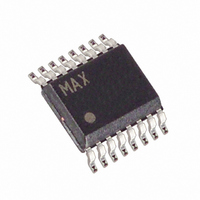MAX4273EEE+ Maxim Integrated Products, MAX4273EEE+ Datasheet - Page 14

MAX4273EEE+
Manufacturer Part Number
MAX4273EEE+
Description
IC CNTRLR HOT SWAP 16-QSOP
Manufacturer
Maxim Integrated Products
Type
Hot-Swap Controllerr
Datasheet
1.MAX4271ESA.pdf
(26 pages)
Specifications of MAX4273EEE+
Applications
General Purpose
Internal Switch(s)
No
Voltage - Supply
2.7 V ~ 13.2 V
Operating Temperature
-40°C ~ 85°C
Mounting Type
Surface Mount
Package / Case
16-SSOP (0.150", 3.90mm Width)
Lead Free Status / RoHS Status
Lead free / RoHS Compliant
3V to 12V Current-Limiting Hot-Swap Controllers
with Autoretry, DualSpeed/BiLevel Fault Protection
If the sensed current is still high after the startup timer
expires, the MOSFET gate is discharged completely as
described below.
In normal operation (after startup), the fast comparator is
used as an emergency off switch. If the load current
reaches the fast comparator threshold, the device quickly
forces the MOSFET off completely. This could happen in
the event of a serious current overload or a dead short.
The fast comparator has a 350ns response time and dis-
charges GATE with a 1mA current. Given a 1000pF gate
capacitance and 12V gate voltage, the MOSFET will be
off in about 12µs. Any additional capacitance connected
between GATE and GND to slow down the startup time
also increases the turn-off time.
In the MAX4273, CEXT goes high impedance during
the fast discharge. This reduces the effective capaci-
tance on GATE if a capacitor is used between GATE
and CEXT, and allows the MOSFET to quickly turn off.
In turn, this allows adjustment of the MOSFET charging
time without affecting the fast discharge rate, although
it does affect the slow discharge rate.
The MAX4271/MAX4272 fast comparator threshold is set
to four times the slow comparator threshold (i.e., 200mV).
The MAX4273 fast comparator threshold is set to 200mV
by connecting RTH to GND, is disabled by connecting
RTH to IN, or is adjustable by an external resistor con-
nected to IN (see Fast Comparator Threshold (RTH)).
The MAX4271 MOSFET driver stays latched off after a
fault condition until it is reset by a negative-going pulse
on the ON pin. The MAX4272 is periodically turned on
after a fault condition with a timeout duration set by an
external timing capacitor on CTIM. The MAX4273 has a
selectable latched mode or retry mode. Connect CTIM
to IN to set the device in latched mode, or use an exter-
nal capacitor at CTIM to set the retry timeout.
Table 1. Status Output Truth Table
14
UVLO DELAY
______________________________________________________________________________________
PERIOD
Yes
No
X
X
X
X
IN
STARTUP
PART IN
Yes
No
X
X
X
X
Latched/Autoretry
ON PIN
High
Low
X
X
X
X
OVERCURRENT
CONDITION
Yes
No
X
X
X
X
Pulse ON low for 20µs (min) to restart after a fault
(MAX4271/MAX4273 in latched mode). Negative pulses
are ignored during autoretry (MAX4273 in autoretry
mode, or MAX4272).
The capacitor on CTIM affects the MAX4272’s retry
timeout period (time the part is shut down after an over-
current event) and the startup time (see the Electrical
Characteristics). The retry timeout period is fixed at 32
times the startup time in order to minimize power dissi-
pation in the external MOSFET in case of a short-circuit
condition (see MOSFET Thermal Considerations). This
is not an issue for parts latched off during a fault condi-
tion since they stay off until commanded on. The
MAX4273 configured in retry mode has a separate
startup timer capacitor (CTON) and retry timeout
capacitor (CTIM). This allows the user to change the
ratio between startup time and retry timeout period.
The status output is an open-drain output that goes low
under the following conditions:
STAT is high only if the part is in normal mode and no
faults are present (Table 1). Figure 5 shows the status
(STAT) output timing diagram.
The UVLO prevents the MAX4271/MAX4272/MAX4273
from turning on the external MOSFET until V
the lockout threshold (2.25V min) for 150ms. The UVLO
protects the external MOSFET from insufficient gate
drive voltage. The 150ms timeout ensures that the
board is fully plugged into the backplane and that V
• During the UVLO delay period
• In startup
• Forced off (ON <0.6V)
• In an overcurrent condition
• In the retry timeout period (or latched off, for the
latched parts)
PERIOD (OR LATCHED OFF DUE TO
OVERCURRENT CONDITION)
PART IN RETRY-TIMEOUT
Over/Undervoltage Lockouts
Yes
No
X
X
X
X
Status Output
(STATUS)
STAT PIN
IN
High
Low
Low
Low
Low
Low
exceeds
IN











